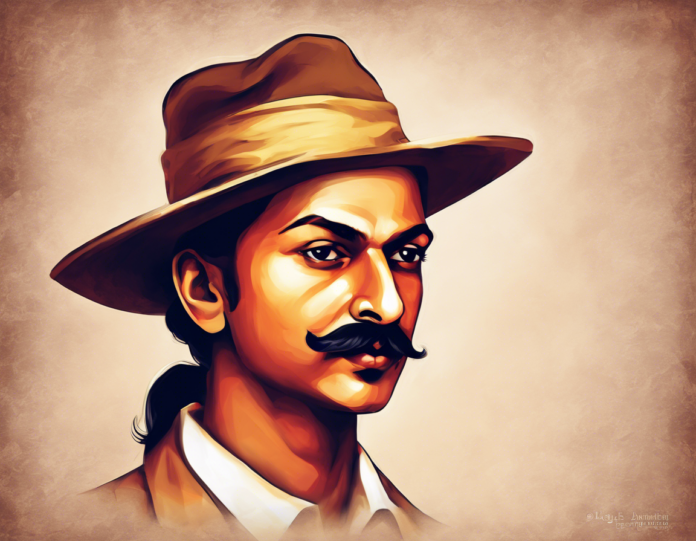Introduction
On September 28th every year, India honors the birth anniversary of one of its most revered freedom fighters – Bhagat Singh. Born in 1907 in a small village in Punjab, Bhagat Singh emerged as a prominent figure in the Indian independence movement. His unwavering courage, fierce patriotism, and revolutionary ideologies continue to inspire generations of Indians even today. As we commemorate Bhagat Singh Jayanti, it is imperative to reflect on his life, sacrifices, and the ideals he stood for.
Early Life and Influences
Bhagat Singh was born to a family that was actively involved in the freedom struggle against British colonial rule. His father, Kishan Singh, was a prominent Sikh leader, and his uncle, Ajit Singh, was a founding member of the Ghadar Party. Growing up in such an environment, Bhagat Singh imbibed patriotic values from a young age. He was deeply influenced by the Jallianwala Bagh massacre in 1919, which further fueled his passion for the country’s liberation.
Entry into Revolutionary Activities
In his teenage years, Bhagat Singh became associated with several revolutionary organizations, including the Hindustan Socialist Republican Association (HSRA). He believed that armed struggle was necessary to overthrow the British Empire and bring about a free and independent India. Along with other revolutionaries like Chandrashekhar Azad and Sukhdev Thapar, Bhagat Singh carried out several acts of resistance against British rule.
The Lahore Conspiracy Case
Bhagat Singh gained nationwide fame after the incident in which he and his associates avenged the death of Lala Lajpat Rai by killing British police officer James A. Saunders. In 1929, he and Batukeshwar Dutt threw non-lethal bombs in the Central Legislative Assembly in Delhi to protest against oppressive laws. The intention was not to harm anyone but to use the trial as a platform to propagate their revolutionary ideas.
Imprisonment and Martyrdom
Bhagat Singh, along with Rajguru and Sukhdev, was arrested for the killing of Saunders and was subsequently tried in what became known as the Lahore Conspiracy Case. Despite immense public support and calls for clemency, Bhagat Singh, Rajguru, and Sukhdev were sentenced to death. On March 23, 1931, the three revolutionaries were hanged in Lahore Central Jail. Shaheed Diwas, or Martyrs’ Day, is observed on this date to commemorate their sacrifice.
Ideological Legacy
Bhagat Singh was not just a freedom fighter but also a thinker whose ideas transcended his time. He believed in the complete independence of India, the abolition of the caste system, socialism, and the empowerment of the masses. His writings, including “Why I am an Atheist” and “To Young Political Workers,” reflect his visionary thinking and commitment to social justice.
Relevance Today
Even decades after his death, Bhagat Singh remains a symbol of courage and determination for the youth of India. His message of standing up against injustice and fighting for a just society is as pertinent today as it was during the freedom struggle. Schools and colleges across the country organize events and discussions to commemorate Bhagat Singh Jayanti and keep his revolutionary spirit alive.
Celebrating Bhagat Singh Jayanti
Bhagat Singh’s contributions to the freedom struggle and his sacrifice for the nation deserve to be remembered and honored. On his birth anniversary, various cultural programs, seminars, rallies, and tribute events are organized to pay homage to the revolutionary icon. People from all walks of life come together to express their gratitude and respect for Bhagat Singh’s indomitable spirit.
Conclusion
Bhagat Singh’s life and legacy continue to inspire millions of Indians to fight for justice, equality, and freedom. On Bhagat Singh Jayanti, let us not only remember his bravery and sacrifice but also reaffirm our commitment to upholding the values he stood for. As we navigate the complexities of the modern world, Bhagat Singh’s words remind us that true patriotism lies in working towards a society where every individual can live with dignity and freedom.
FAQs
1. Why is Bhagat Singh considered a revolutionary hero in India?
Bhagat Singh is revered as a hero in India for his unwavering commitment to the country’s independence, his fearless acts of resistance against British colonial rule, and his revolutionary ideologies that inspired a generation of freedom fighters.
2. What were some of the key contributions of Bhagat Singh to the Indian freedom struggle?
Bhagat Singh was instrumental in advocating for complete independence, challenging oppressive laws through non-violent and armed resistance, and raising awareness about social issues such as the caste system and poverty. His sacrifice at a young age left an indelible mark on India’s fight for freedom.
3. How did Bhagat Singh’s ideologies differ from other freedom fighters of his time?
Bhagat Singh’s socialist beliefs set him apart from other leaders of the independence movement. He advocated for the empowerment of the masses, the abolition of the caste system, and the establishment of a just and equitable society.
4. How do schools and colleges in India commemorate Bhagat Singh Jayanti?
Educational institutions in India organize various events such as debates, essay competitions, cultural programs, and exhibitions to commemorate Bhagat Singh Jayanti. These activities aim to educate students about Bhagat Singh’s life and legacy.
5. What is the significance of observing Martyrs’ Day on March 23rd?
March 23rd, also known as Shaheed Diwas, marks the day when Bhagat Singh, Rajguru, and Sukhdev were martyred. Observing Martyrs’ Day is a way to pay tribute to their sacrifice and remember the ultimate price they paid for the freedom of the nation.





